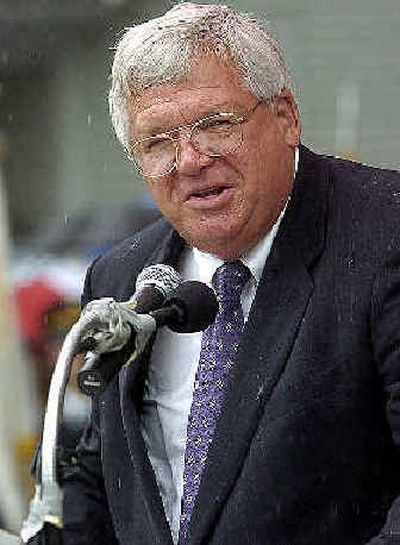Hastert’s hometown remains in the money

WASHINGTON – When Scott B. Palmer received an honorary degree in 2002 from his alma mater, Aurora University in Illinois, he urged graduates to “give back to our university, to our community and to our country.”
As chief of staff to House Speaker Dennis Hastert, R-Ill., Palmer runs a congressional office that has done just that for Aurora, birthplace of his boss and largest city in his home district.
Hastert has earmarked $24 million in grants for Aurora-based nonprofit groups since becoming speaker in 1999, using an obscure section of federal spending bills passed each year.
After the ceremony honoring Palmer, Aurora University got $9.8 million to construct a teacher training institute. Aurora’s Rush-Copley Medical Center, where Palmer is an unpaid trustee, captured a total of $5.5 million in 2002 and 2003. About $3.4 million has gone to another Aurora hospital where a Hastert staff member worked.
Communities represented by powerful lawmakers have always had an edge in the scramble for federal funds. But Aurora’s applicants have unusually close connections to Hastert’s staff. And unlike big spenders before him – including such masters of pork-barrel politics as the late speaker Tip O’Neill, D-Mass. – Hastert is a conservative Republican who favors smaller government and leaner domestic budgets. He has led the fight to enforce the White House’s spending limits for the highways program and domestic spending bills, sometimes over the objections of GOP committee chairmen.
Congressional earmarking lets lawmakers write funding for hometown projects directly into legislation. In recent years, GOP leaders have consolidated many spending bills into a single “omnibus” bill containing thousands of earmarks with legislator support.
GOP officials defend earmarking, saying lawmakers are better attuned to communities than bureaucrats. But party leaders and committee officials have an edge in the process, said Keith Ashdown of the nonpartisan group Taxpayers for Common Sense.
“When you’re flat-lining the amount of domestic spending that can go out under the formulas, that’s when the big dogs can move themselves to the front of the line,” Ashdown said.